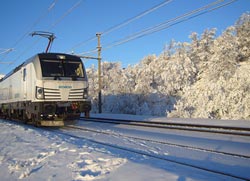Siemens to deliver locomotives to Finland

Vectron in Norway<br>
The Finnish Railways VR Group intends to place an order for 80 electric Vectron locomotives with Siemens worth more than 300 million Euros.
This is the largest rolling stock investment ever made by VR Group and the second-largest purchase in Europe this year. The order will include an option for an additional 97 locomotives as well as the maintenance of the locomotives over a period of 10 years.
The contracts will be signed in the very near future. The new locomotives designed to operate on broad gauge tracks are scheduled to be delivered one after the other from 2016. The first electric locomotives start operational services in 2017, and the entire fleet will be delivered to Finland by 2026.
In both freight and passenger transportation they will also replace the existing Soviet-type locomotives, some of which were built in the 1970s. “For Siemens this marks the largest single contract so far for its latest generation of Vectron locomotives and the first for this type in the broad gauge version”, emphasizes Jochen Eickholt, CEO of the Siemens Rail Systems Division. The electric locomotives will be manufactured at the Siemens plant in Munich, Germany, and the bogies at the Siemens plant in Graz, Austria.
The new locomotives are designed to operate reliably even under the extreme climatic conditions in Scandinavia during their long service life. Siemens was able to provide clear evidence of their capability during comprehensive test and authorization trips in Sweden and Norway.
“The selection was made after a long and careful examination. The electric locomotive manufactured by Siemens is well suited to the challenging conditions in Finland”, says VR Group's President and CEO Mikael Aro. The locomotives for VR-Yhtymä Oy will benefit from the valuable experience gained during these tests. In addition, the Vectron fleet has already traveled far more than one million kilometers. Vectron locomotives are operating according to timetable in Germany, Poland and Sweden. The new generation of electric Siemens locomotives is well established in the market. Siemens was already able to sell more than 50 of them to seven international customers so far.
The Vectron locomotives are based on a technical platform. This concept enables Siemens to design and manufacture vehicle variants such as alternating system or multi system locomotives according to customer-specific requirements within a short time. Authorization has already been granted for Germany, Austria, Hungary, Poland, Romania and Sweden.
The Siemens Infrastructure & Cities Sector (Munich, Germany), with approximately 90,000 employees, focuses on sustainable technologies for metropolitan areas and their infrastructures. Its offering includes products, systems and solutions for intelligent traffic management, rail-bound transportation, smart grids, energy efficient buildings, and safety and security. The Sector comprises the divisions Building Technologies, Low and Medium Voltage, Mobility and Logistics, Rail Systems and Smart Grid. For more information, visit http://www.siemens.com/infrastructure-cities
The Siemens Rail Systems Division (Berlin, Germany) is an international leader in providing rolling stock and related services. Its portfolio covers the full range of vehicles – from railroad cars to metros and locomotives to trams and light-rail vehicles. The Division combines competence in the areas of local, long-distance, and logistical transport to offer comprehensive expertise for environmentally friendly, efficient, and reliable rail vehicles, which are already in use in more than 40 countries. For more information, visit http://www.siemens.com/rail-systems/
Reference Number: ICRL201312003e
Contact
Mr. Peter Gottal
Rail Systems Division
Siemens AG
Nonnendammallee 101
13629 Berlin
Germany
Tel: +49 (30) 386-20280
peter.gottal@siemens.com
Media Contact
More Information:
http://www.siemens.com/press/vectron-finlandAll latest news from the category: Corporate News
Newest articles

NASA: Mystery of life’s handedness deepens
The mystery of why life uses molecules with specific orientations has deepened with a NASA-funded discovery that RNA — a key molecule thought to have potentially held the instructions for…

What are the effects of historic lithium mining on water quality?
Study reveals low levels of common contaminants but high levels of other elements in waters associated with an abandoned lithium mine. Lithium ore and mining waste from a historic lithium…

Quantum-inspired design boosts efficiency of heat-to-electricity conversion
Rice engineers take unconventional route to improving thermophotovoltaic systems. Researchers at Rice University have found a new way to improve a key element of thermophotovoltaic (TPV) systems, which convert heat…



